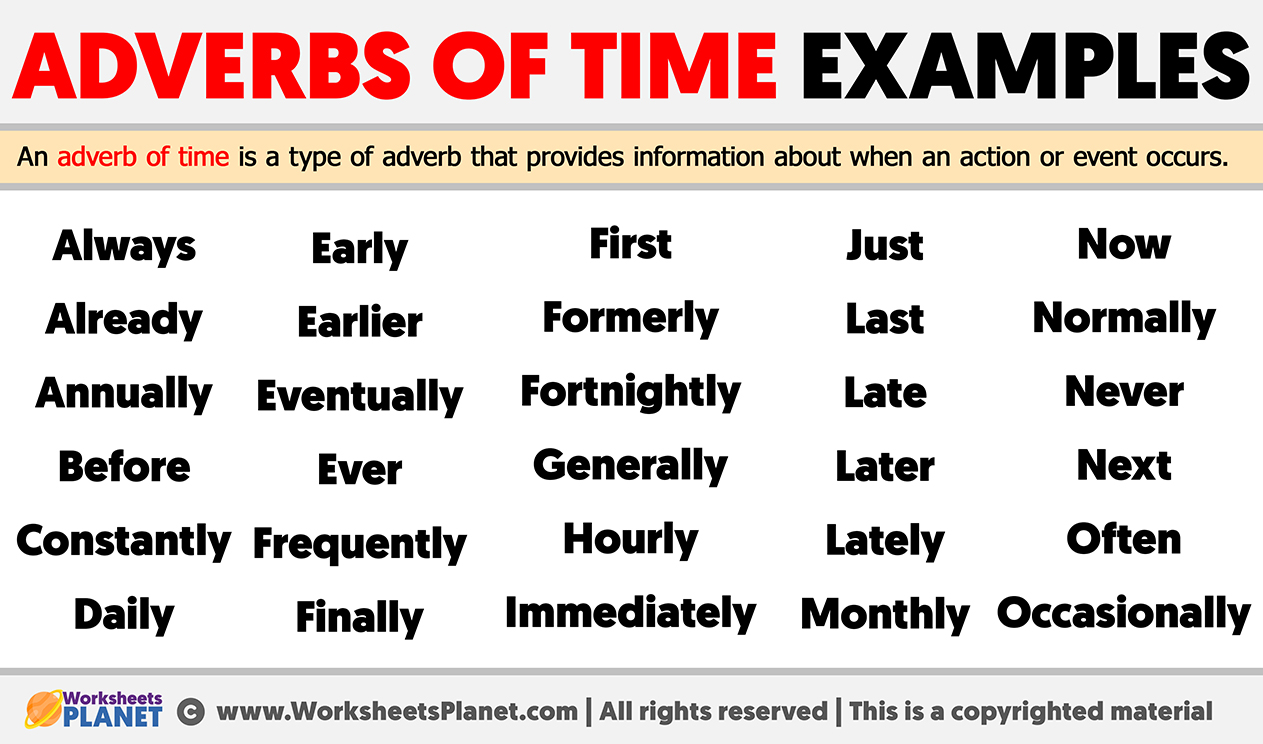An adverb of time is a type of adverb that provides information about when an action or event occurs. Here you have a list with adverbs of time examples:

- Always
- Already
- Annually
- Before
- Constantly
- Daily
- Early
- Earlier
- Eventually
- Ever
- Frequently
- Finally
- First
- Formerly
- Fortnightly
- Generally
- Hourly
- Immediately
- Just
- Last
- Late
- Later
- Lately
- Monthly
- Now
- Normally
- Never
- Next
- Often
- Occasionally
Some examples of sentences using adverbs of time
Always:
- She always starts her day with a cup of coffee.
- He always arrives at the office before anyone else.
Already:
- The food was already cold by the time we sat down to eat.
- She had already finished reading the book by the time the movie adaptation was released.
Annually:
- The company holds its board meeting annually to discuss its financial performance.
- The charity event takes place annually to raise funds for the local community.
Before:
- Please finish your homework before dinner.
- He had never visited Paris before his recent trip.
Constantly:
- The toddler is constantly exploring and getting into mischief.
- The computer program constantly monitors network traffic for security threats.
Daily:
- He exercises daily to maintain his fitness.
- Daily, she takes a walk in the park to clear her mind.
Early:
- She woke up early to catch the sunrise.
- The meeting was scheduled for early tomorrow morning.
Earlier:
- I saw him earlier at the grocery store.
- She had mentioned the party earlier in the week.
Eventually:
- With hard work and determination, you will eventually reach your goals.
- Eventually, the sun dipped below the horizon, signaling the end of the day.
Ever:
- Have you ever been to Europe?
- It’s the best movie I’ve ever seen.
Frequently:
- They frequently go on road trips during the summer.
- The manager frequently checks in with the team to assess progress.
Finally:
- After years of hard work, he finally achieved his dream of owning a home.
- She finally made a decision after hours of deliberation.
First:
- First, we’ll need to gather all the necessary materials.
- The first time I tried sushi, I was pleasantly surprised.
Formerly:
- The company was formerly known for its innovative products.
- He formerly worked as a chef before pursuing a career in photography.
Fortnightly:
- The magazine is published fortnightly, providing readers with bi-weekly updates.
- They have fortnightly meetings to review project progress.
Generally:
- Generally, people tend to be more productive in the morning.
- The restaurant generally offers a special menu on weekends.
Hourly:
- The bus departs hourly from the station.
- The security system logs data hourly to track activity.
Immediately:
- She responded to the email immediately after receiving it.
- The fire alarm went off, and everyone evacuated the building immediately.
Just:
- He had just finished his meal when the phone rang.
- She arrived just in time to catch the last train.
Last:
- They went on a vacation to Hawaii last summer.
- The last chapter of the book was the most suspenseful.
Late:
- He apologized for being late to the meeting.
- The train arrived late, causing delays for commuters.
Later:
- She’ll call you back later when she has more information.
- We can discuss that issue later during the meeting.
Lately:
- She has been feeling stressed lately due to work pressures.
- Lately, he’s taken up gardening as a hobby.
Monthly:
- The rent is due monthly on the first of the month.
- They have a monthly book club meeting.
Now:
- I can’t talk right now, I’m in a meeting.
- The sun is setting, and it’s beautiful right now.
Normally:
- Normally, I take the bus to work, but today I’m driving.
- He doesn’t normally eat spicy food, but he tried it anyway.
Never:
- He has never traveled outside of his home country.
- She has never missed a single day of school.
Next:
- The concert is scheduled for next Saturday.
- We’ll discuss the project in more detail next week.
Often:
- They often go for long walks in the evening.
- Often, creativity flourishes in an open and supportive environment.
Occasionally:
- They occasionally visit their grandparents’ farm during the holidays.
- I occasionally treat myself to a piece of chocolate.

